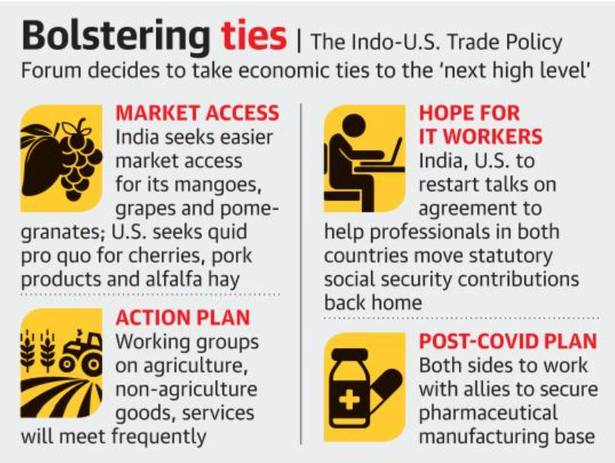International Relations
India-US Trade Policy Forum
- 24 Nov 2021
- 5 min read
Why in News
Recently, after a gap of four years, the Trade Policy Forum (TPF) was convened between the United States and India. The Forum resolved to take economic ties between the two countries to the ‘next high level’ and exchanged views on ‘potential targeted tariff reductions’.
Key Points
- Aim: To activate working groups of the TPF on agriculture, non-agriculture goods, services, investment, and intellectual property to meet frequently and address issues of mutual concern in a mutually beneficial manner.
- The idea is to deliver tangible benefits to both countries by resolving outstanding market access issues.
- Highlights of the forum:
- Mutual Market Access: The Forum has decided to forge an agreement to facilitate U.S. market access from India, and reciprocate with similar access in the Indian market to many agriculture and animal products.
- Restoration of the GSP: India has sought restoration of the GSP (Generalized System of Preferences) benefits by the U.S.
- Totalisation Agreement: The Forum also agreed on the significance of negotiating a Social Security Totalization Agreement in the interest of workers from both sides.
- A Totalization Agreement is a convention between two countries preventing duplicate social security contributions for the same income.
- It would allow workers from both countries to move their retirement savings, the lack of which particularly affects Indian IT workers in the U.S.
- Towards Rules-based Global Trading System: India and the U.S. also discussed engagement in various multilateral trade bodies including the World Trade Organisation (WTO) and the G20 for achieving a shared vision of a transparent, rules-based global trading system among market economies and democracies.
- The Forum also decided to find mutually agreed solutions on outstanding WTO disputes between the two countries.
- Ethanol Supply: The U.S. indicated an interest in supplying ethanol to India for its goal of 20% ethanol blending with petrol by 2025.
- Pharma Cooperation: The two sides decided to partner with allies in developing a secure pharmaceutical manufacturing base and de-risk global supply chains in such critical sectors like health.
- Services Front: The Forum discussed ways in which legal, nursing and accountancy services can facilitate growth in trade and investment, and sought to work together on electronic payment services and the digital economy.
- Collaboration in Critical Technologies: Both countries recognise the importance of critical and emerging technologies like cyberspace, semiconductors, Artificial Intelligence, 5G, and future generation telecommunications technology.
- Climate Change: Both countries exchanged views on approaches to increase the utilization of renewable energy to achieve net-zero emissions, as agreed in the India – US Climate and Clean Energy Agenda 2030 Partnership.
Way Forward
- Initiating Tariff Removal: The first step towards a potential deal is for India to take the initiative and consider unilaterally removing its retaliatory tariffs. This will represent India as willing to be a constructive player in trade talks.
- Even though removing the tariffs without a commitment from the US is a leap of faith, it ultimately will be beneficial for the bilateral trade relationship.
- Together Countering China: From a strategic point of view, one of the ways that India can counter China is through deepening trade ties with partners who are committed to supporting India’s growth.
- A deal with the US will be beneficial for India, both strategically and economically.
- As the US companies assess whether to shift some of their manufacturing from China, a vibrant trade strategy can complement the Production-Linked Incentive (PLI) schemes, and help to boost both manufacturing and exports.
- Facilitating Digital Growth: To promote further growth in the digital sphere, which represents over USD 100 billion of bilateral trade, the two must address several foundational issues; digital service tax, cross-border data flows and common cellular standards.
- It’s important that on the digital services tax, India accords with emerging global agreements that will accelerate trade.
Source: TH







